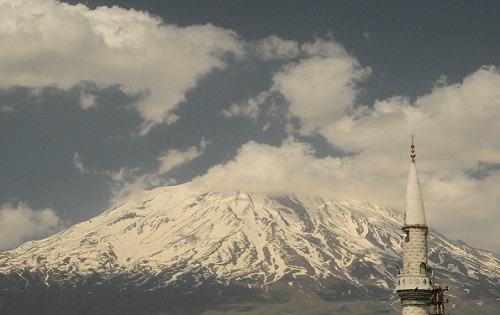
Mount Ararat and a minaret: two symbols of Turkey. (Photo by Gary Fallesen, Mission: Ararat 2015)
LeBron James is probably known to those who don’t even follow professional basketball. Steph Curry and Kevin Durant may be as well.
Enes Kanter does not have as high a profile as any of those National Basketball Association finalists or even as his teammate Russell Westbrook. But he is a professional athlete playing in the sports-crazy USA. So his speaking out about the state of Turkey helps raise awareness about what is happening in his homeland.
Kanter, a center for the NBA’s Oklahoma City Thunder and outspoken opponent of President Recep Tayyip Erdogan’s government, spoke Tuesday on ESPN’s Outside the Lines about his father being jailed in Turkey. His father, a college professor, was detained after an arrest warrant was issued for Kanter, who has not been to his home country in two years.
“I’m sure my dad, when he is put in jail, will get tortured,” Kanter said.
This is the sad state of Turkey, where the church barely exists today.
Yesterday we talked about focusing on people living in Muslim nations, where Climbing For Christ serves, who are under siege and in need of our prayers. Let’s turn our attention now to Turkey.
Background: In June 2015, as we were in Kurdish villages on Mission: Ararat, Erdogan failed in a bid to see his ruling party gain the majority in Parliament and for the first time Kurdish members of the People’s Democratic Party were elected to national office. There was a great celebration among Kurdish people. Sadly, it was short-lived.
One month later, suspiciously, peace talks between the government and Kurdish rebels broke down and hostilities renewed.
Christine Mehta, a researcher with Physicians for Human Rights, who recently wrote an excellent op-ed story (“A Doctor’s Trial in a Turkish Border Town”) for The New York Times, said: “Young Kurdish militants from the youth wing of the Kurdistan Workers’ Party, or PKK, inspired by the success of Kobani and Rojava cantons in Syria, built barricades in towns and cities across southeastern Turkey and created de facto liberated zones. Turkish forces laid siege to rebel towns and imposed long military curfews, and their tanks shelled the towns without restraint. In the subsequent months numerous neighborhoods in Kurdish cities and towns like Diyarbakir, Cizre, Sirnak, Silopi, Nusaybin and Yuksekova were reduced to rubble in the fighting.”
It’s estimated that at least 2,721 people were killed in the next 1¾ years, including 393 civilians, 927 members of security forces, 1,257 PKK militants and 219 youths of “unknown affiliation.”
“The Kurdish militants had retreated into the mountains by June 2016,” Mehta wrote, which was why Mission: Ararat 2016 was cancelled (as the government closed Mount Ararat and other trekking areas). “Soon after, Turkey had to live through the failed July 2016 coup, which killed more than 250 people and injured many more. [Erdogan] blamed the Pennsylvania-based Islamist cleric Fetullah Gulen and his followers in the Turkish military for the coup. A wide-ranging purge of suspected Gulenists followed.
“Although the Kurds and Gulenists have traditionally had a hostile relationship, Mr. Erdogan’s government extended the purge and prosecution to Kurds as well as liberal Turks, who were critical of the military operations in Kurdish areas.”
Erdogan enforced a state of emergency. His power has grown and thousands have been arrested. At the same time, terrorism has grown. Turkey is a state of confusion.
Turkey, with a population of nearly 80 million, is 96.3 percent Muslim. The land where the Apostle Paul planted the early church is now 0.6 percent Christian (that’s about 475,000 people). The few existing Christians (mostly Greek and Armenian) “suffer the double ignominy of religious and ethnic marginalization,” according to Christianity Today.
“Though the government is officially secular and many Turks are only nominally Muslim, conversion to Christianity is considered a betrayal of heritage and homeland. Persecution stemming from this perspective has stunted church growth and crippled the small Christian community.”
Turkey ranks 37th on Open Doors World Watch List, a measuring stick for the persecuted church. Even sadder, the Joshua Project estimates only 1 kingdom worker for every 50,000 people living in a Muslim unreached people group in Turkey.
Pray: For the Lord of the harvest to send workers willing to enter this hardened field. We ask that hostilities between Turks and Kurds would ease. In turn, we pray for the door to be reopened to Climbing For Christ for our return to eastern Turkey, where we may find further opportunities to share the love of Jesus, especially among Kurdish people. 